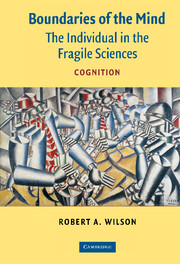Book contents
- Frontmatter
- Contents
- List of Tables and Figures
- Acknowledgments
- Boundaries of the Mind
- PART ONE DISCIPLINING THE INDIVIDUAL AND THE MIND
- PART TWO INDIVIDUALISM AND EXTERNALISM IN THE PHILOSOPHY OF MIND AND THE COGNITIVE SCIENCES
- PART THREE THINKING THROUGH AND BEYOND THE BODY
- 8 The Embedded Mind and Cognition
- 9 Expanding Consciousness
- 10 Intentionality and Phenomenology
- PART FOUR THE COGNITIVE METAPHOR IN THE BIOLOGICAL AND SOCIAL SCIENCES
- Notes
- References
- Index
9 - Expanding Consciousness
Published online by Cambridge University Press: 02 December 2009
- Frontmatter
- Contents
- List of Tables and Figures
- Acknowledgments
- Boundaries of the Mind
- PART ONE DISCIPLINING THE INDIVIDUAL AND THE MIND
- PART TWO INDIVIDUALISM AND EXTERNALISM IN THE PHILOSOPHY OF MIND AND THE COGNITIVE SCIENCES
- PART THREE THINKING THROUGH AND BEYOND THE BODY
- 8 The Embedded Mind and Cognition
- 9 Expanding Consciousness
- 10 Intentionality and Phenomenology
- PART FOUR THE COGNITIVE METAPHOR IN THE BIOLOGICAL AND SOCIAL SCIENCES
- Notes
- References
- Index
Summary
THE RETURN OF THE CONSCIOUS
Although the 1990s was officially the “Decade of the Brain” in the cognitive sciences, judging by the volume and range of literature, for philosophers of mind it was, rather, the “Return of the Conscious.” From early in the decade, works such as John Searle's The Rediscovery of the Mind and Owen Flanagan's Consciousness Reconsidered aimed to restore consciousness to center stage in the philosophy of mind. This restoration was in part a way of correcting a distortion that the cognitive revolution's emphasis on unconscious mental processing had wrought, initiating a culture in which discussions of consciousness could be held without philosophical embarrassment. By the end of the decade, the philosophical literature on consciousness had outstripped that on any other topic in the philosophy of mind.
To be sure, much of the work on consciousness in the last dozen years or so has attended to or even stemmed from research in the neurosciences. But perhaps the issue that has most engaged philosophers of mind has been whether the neurosciences or indeed any physical science could reveal all there is to know about consciousness. Claims that there would, of necessity, remain some sort of explanatory or ontological gap between the world revealed by science and conscious phenomena themselves had been articulated and defended by Thomas Nagel, Frank Jackson, and Joseph Levine more than twenty years ago.
- Type
- Chapter
- Information
- Boundaries of the MindThe Individual in the Fragile Sciences - Cognition, pp. 214 - 241Publisher: Cambridge University PressPrint publication year: 2004



